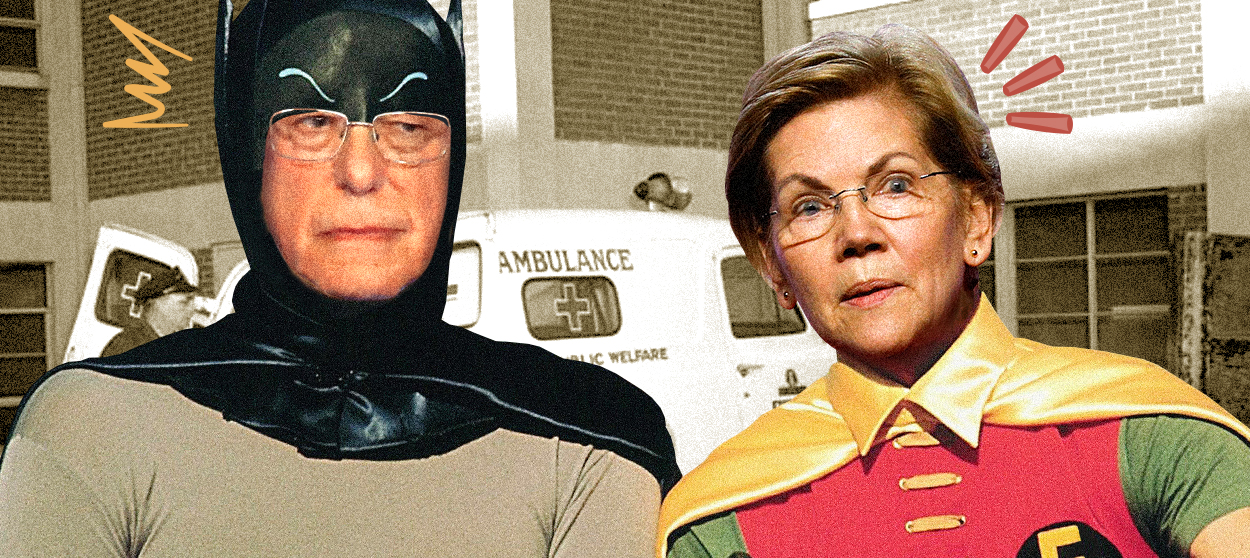Bernie Sanders and Elizabeth Warren: The health care dynamic duo
On Medicare-for-all, it's those two against the world


A free daily email with the biggest news stories of the day – and the best features from TheWeek.com
You are now subscribed
Your newsletter sign-up was successful
On the first night of the second round of Democratic president debates Tuesday, Bernie Sanders and Elizabeth Warren dominated the conversation about health care, which took up most of the debate's first hour. Whether they planned it that way or not, it ended up being the two of them defending their Medicare-for-all proposal against the rest of the candidates.
It shows how much left-wing advocacy — especially from the Sanders camp — has reshaped the terrain of American politics in a very short time.
Now, it wasn't an easy walk for Sanders and Warren. On the contrary, both the moderators and the other candidates were clearly gunning for them. Jake Tapper seemed to think that he needed to speak as a stand-in for Democrats' GOP opponents rather than explore their thinking. Former Rep. John Delaney (D-Md.), currently polling in 14th place at 0.7 percent, got a bizarre amount of attention. Nevertheless, both Sanders and Warren were well-prepared (Sanders in particularly was markedly more on his game than in the first debate), and managed convincing rebuttals to every centrist objection.
The Week
Escape your echo chamber. Get the facts behind the news, plus analysis from multiple perspectives.

Sign up for The Week's Free Newsletters
From our morning news briefing to a weekly Good News Newsletter, get the best of The Week delivered directly to your inbox.
From our morning news briefing to a weekly Good News Newsletter, get the best of The Week delivered directly to your inbox.
There were three main lines of attack. The first was focused on choice — the argument that Medicare-for-all would reduce the amount of options in the health care system. Sanders made the valid rejoinder that under employer-sponsored insurance, people have no choice to keep their insurance plan, because they could lose it if they get laid off or their boss decides to switch plans. He also effectively noted that, unlike the increasingly narrow provider networks of private insurance, his Medicare-for-all bill would create a "system which gives you freedom of choice with regard to a doctor or a hospital" because all providers would accept it.
He also could have mentioned the fact that many people would choose to have a universal high-quality health care program that includes all Americans equally, and preserving a fragmented partly-private system forecloses that option. As usual for centrists, the rhetoric of "choice" is being used to obscure ideology and priorities rather than allow for maximum options.
The second attack was on cost. Delaney once again made the false assertion that if all procedures were reimbursed at Medicare payment rates, all hospitals would immediately go bankrupt. Sanders correctly shot back that hospitals would be able to save huge sums by consolidating their billing departments. Canadian hospitals spend about 12 percent on administration, relative to 25 percent in the U.S., which should easily account for the reimbursement difference on its own.
Meanwhile, Tapper repeatedly attempted to bait Warren into saying she would raise taxes on the middle class, but she stuck to the more important fact that once premiums, deductibles, and almost all other cost-sharing currently mandated by the private insurance system is deleted, the middle class would have lower overall costs despite some higher taxes. "Giant corporations and billionaires are going to pay more. Middle-class families are going to pay less out of pocket for their health care," she said.
A free daily email with the biggest news stories of the day – and the best features from TheWeek.com
Delaney was inadvertently correct in one way. As I explain here in detail, in addition to administrative efficiencies, the cost of Medicare-for-all will largely depend on how hard we want to squeeze providers, who are drastically overpaid relative to other rich countries. If we slashed their payment rates down to the rich country average, we could have Medicare-for-all without any new taxes at all — though that would cause a ton of disruption. More realistically, we could attack the worst of waste, fraud, and outright price-gouging, and fund Medicare-for-all with only a modest new tax of some sort.
Finally, centrists questioned the quality of Medicare-for-all coverage. Rep. Tim Ryan (D-Ohio) asserted that it might be worse than what some of the country's few remaining union members currently enjoy. This is straightforward nonsense; the Sanders plan would be far more generous than virtually all private plans — as Sanders said, "I do know it, I wrote the damn bill."
Even the clear anti-left bias of CNN (whose executives and investors would lose out big time under a Sanders or Warren presidency, incidentally) served Sanders and Warren in a way. The entire discussion was framed as a dispute over the merits of Medicare-for-all — rather than the centrists' various ObamaCare-plus compromise schemes. Meanwhile Delaney, for all the ridiculously disproportionate time he got, also made a decent debate foil. (Later, Warren got perhaps the best zinger of the night blasting him for lack of ambition.)
Now, Sanders and Warren do have markedly different politics and priorities. But it was clear Tuesday night that, relative to the other candidates, they are very much on the same basic team. It's anybody's guess who will win the primary, but if I had to guess, the two of them will remain like that until the end.
Ryan Cooper is a national correspondent at TheWeek.com. His work has appeared in the Washington Monthly, The New Republic, and the Washington Post.
